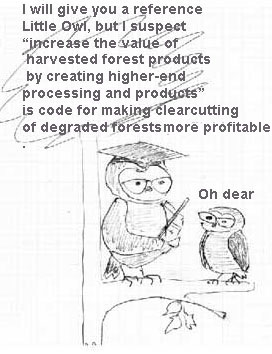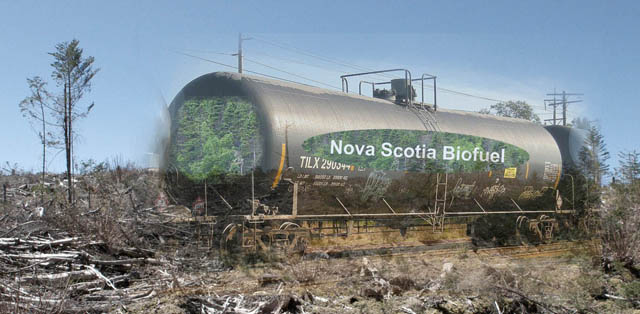Developing biofuels and the like remains a high priority of L&F
 Addendum Dec 12, 2018: In today’s Chronicle Herald: N.S. adjusts refinery environmental assessment regulations By Stuart Peddle. “The province is changing environmental assessment regulations for small oil refineries after receiving inquiries about the production of hydrocarbons from wood fibre…Stephen Thomas, energy campaign co-ordinator with the Ecology Action Centre, said the move took them by surprise…for us, our question is what is Nova Scotia trying to attract by these changes and why are they weakening environmental regulations to try and attract these oil refineries?”
Addendum Dec 12, 2018: In today’s Chronicle Herald: N.S. adjusts refinery environmental assessment regulations By Stuart Peddle. “The province is changing environmental assessment regulations for small oil refineries after receiving inquiries about the production of hydrocarbons from wood fibre…Stephen Thomas, energy campaign co-ordinator with the Ecology Action Centre, said the move took them by surprise…for us, our question is what is Nova Scotia trying to attract by these changes and why are they weakening environmental regulations to try and attract these oil refineries?”
So it seems that government is well on its way to “recommending changes to laws, regulations..[for] facilitating economic development and reducing regulatory and administrative barriers to business” (from the job description).
The DNR Company Men are still driving priorities at NSDNR/L&F.
———————
Today (Dec 11) I received notice about another high level position in L&F, this one for Manager, Innovation & Business Development.
It is dated Dec 7, 2018 on the jobs.novascotia.ca website with an Apply-By-Date of Dec 21, 2018.
From “About Our Opportunity” (bolding is mine):
As the Manager of Innovation and Business Development, you will be part of the Economic Development and Trade Division team and will work directly with private sector businesses with a core focus on development of innovative technologies and processes within the natural resources industry.
The primary focus of your role will be to support the sustainable development of the province’s forest resources in order to develop and attract investment and trade, create high value jobs and grow the economy. You will achieve this by recommending changes to laws, regulations, policies and strategies to maintain the sustainability of our natural resources while facilitating economic development and reducing regulatory and administrative barriers to business. You will also assess/evaluate business plans, provide industry projections and conduct sector analysis.
You will also create and implement bio-economy action plans and programs to encourage innovative ways to increase the value of harvested forest products by creating higher-end processing and products which will improve economic, environmental, and social benefits for Nova Scotians.
You will work and liaise with three levels of Government on various projects and initiatives and will provide advice, recommendations and/or briefings to senior management and Government leaders. You will also influence the development, promotion and marketing of natural resource companies through liaison with CEOs and business development agencies on requests related to natural resources and the bio-economy.
‘Not clear where this position fits into the hierarchy:

From a FOIPOP document; cited at the bottom as “intended for Public Use”. Click on image to access the document.
‘Wouldn’t be surprised if they get some applications from or have already recruited Company Men from the Cellufuel-related folks. Cellufuel, which goes back to Dexter days, is the NS start-up biofuel company which has received at least $4.5 million in public money and went into a “temporary shutdown” mode in July of 2017.
I wonder, if “facilitating economic development and reducing regulatory and administrative barriers to business” includes such things as a condensed softwood sawmill industry, full-tree harvesting, a 2+% mandate for biodiesel and slacker Allowable Gross Vehicle Weight regulations to make it [a biorefinery sector] competitive, as cited in Value Proposition for a Biorefinery Sector in Nova Scotia (BioApplied & FPInnovations, Jan 2017).
I don’t think that’s what Prof Lahey had in mind in his one recommendation related to bioenergy:
35. DNR and other relevant agencies of the provincial government, along with municipal governments and regional development agencies, should work together with project developers to support and enable small‐scale wood‐energy projects that will allow low‐ quality wood to be used in heating hospitals, schools, government office buildings, correctional facilities, and other public buildings.
Regrettably, the Independent Review did not deal with forest bioenergy issues, a major concern of Nova Scotians, in any depth (see Posts, Sep 7, and Sep 8, 2018). Clearly, L&F has taken that as a signal that it is OK to take their Biorefinery and related plans out of the cupboard.

“The exponential growth of the bioeconomy is a global threat. Instead of contributing to climate mitigation, bioenergy and ‘bio’ products keep energy generation locked-in to the carbon cycle, decrease the amount of land available for food crops, drive land-grabs, and decimate forests – our most efficient carbon sinks.” – Global Forest Coalition
Some NSFN posts on biofuels and the like:
Allan Eddy retains interests in biomass
May 11, 2018
Cellufuel wants access to Nova Scotia’s “Inactive Forests”
August 2, 2017
Are biofuels from Nova Scotia forests good for the environment? Show us the science!
May 4, 2017
Nova Scotia’s Biorefinery Plan cites full-tree harvesting, other requirements to make it competitive
February 22, 2017. “Nova Scotia’s Biorefinery Plan cites a condensed softwood sawmill industry, full-tree harvesting, a 2+% mandate for biodiesel, slacker Allowable Gross Vehicle Weight regulations to make it competitive, but is vague on role of primary forest biomass and short on carbon accounting; senior NSDNR bureaucrats have been directly involved in developing the plan.”
Nova Scotia’s Biofuel Bonanza
January 27, 2017
Progress Report did not highlight key priorities in NSDNR Business Plan
Sep 2, 2016
Bio-based fuels from our forests?
July 7, 2016
Also view:
– Life after pulp: energy miracles, jobs, and other Nova Scotia government delusions
Linda Pannozzo in the Halifax Examiner, May 5, 2017.
– Bioeconomy Day of Action – 7 November 2018
Environmental Paper Network. “The industrialisation of the Bioeconomy poses risks to the climate, the environment, and people”
